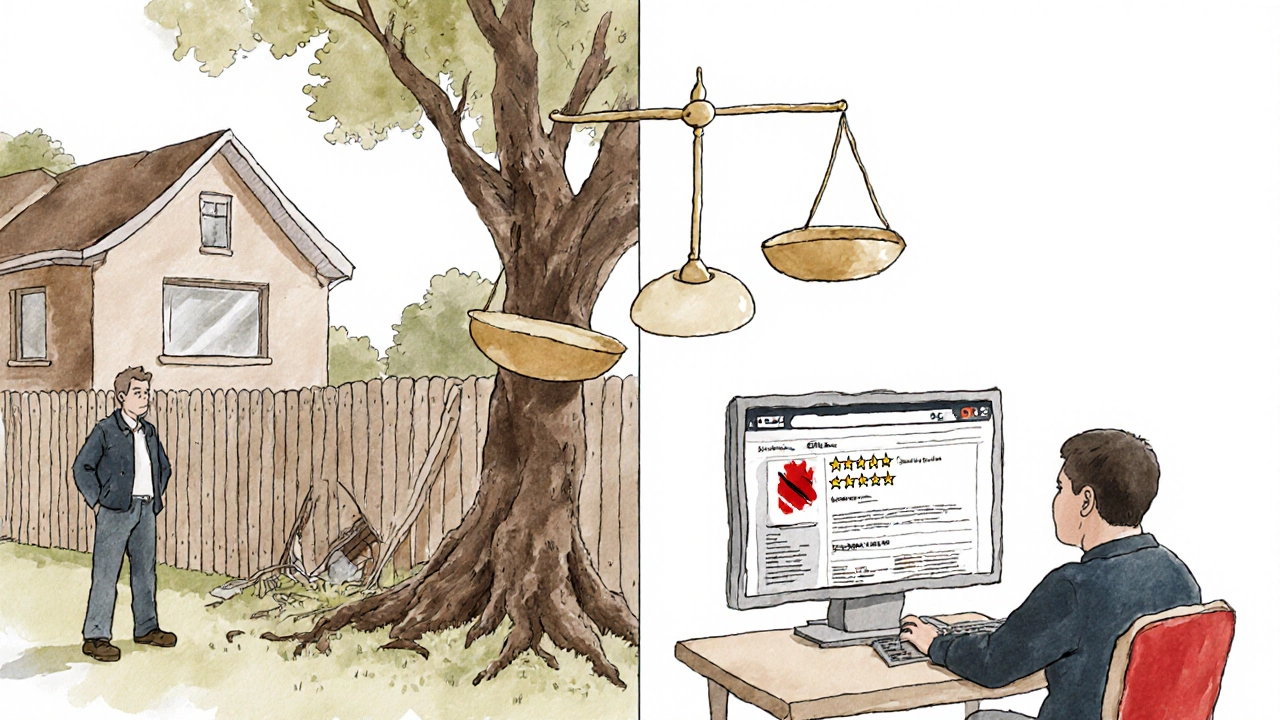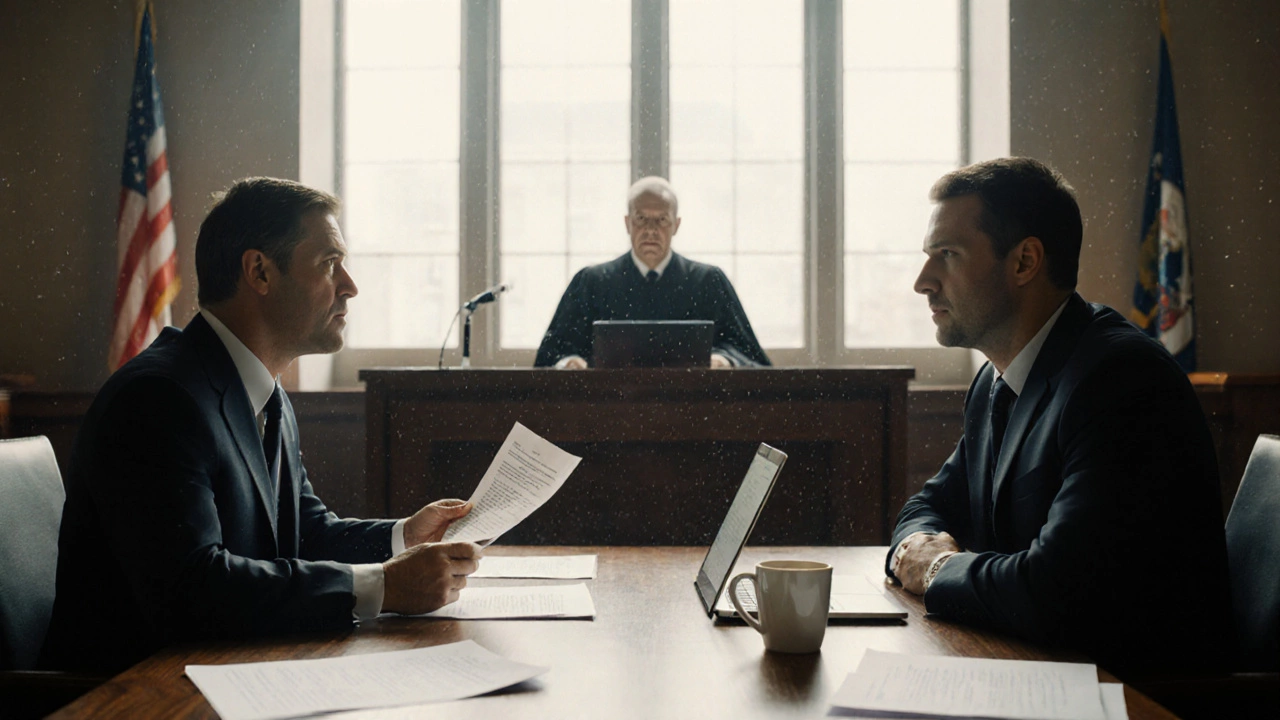Civil Case Decision Guide
This tool helps you determine if your situation might qualify as a civil case and assesses the potential viability of pursuing legal action. Based on your answers, we'll provide guidance on whether you should consider mediation, settlement, or formal legal proceedings.
A civil case is when one person or organization sues another for harm, money, or a specific action - not because a crime was broken, but because a legal right was violated. Unlike criminal cases, where the state punishes someone for breaking the law, civil cases are about fixing wrongs between private parties. You won’t go to jail in a civil case. But you might have to pay thousands of dollars, return property, or follow a court order.
What Happens in a Civil Case?
In a civil case, the person filing the lawsuit is called the plaintiff. The person being sued is the defendant. The plaintiff says, ‘You did something wrong to me, and I want compensation or action.’ The defendant responds, saying either ‘I didn’t do it’ or ‘I did it, but it wasn’t wrong.’
The court doesn’t decide if someone is ‘guilty’ like in a criminal trial. Instead, the judge or jury asks: ‘Is it more likely than not that the defendant is responsible?’ This is called the ‘balance of probabilities.’ It’s a lower standard than ‘beyond reasonable doubt’ used in criminal cases. So even if there’s some doubt, if the evidence leans just a bit more toward the plaintiff, they win.
Most civil cases never go to trial. Around 90% settle before that point - often with a payment, apology, or agreement to change behavior. But if it does go to court, both sides present evidence: documents, photos, witness statements, expert opinions. The judge then decides who wins and what remedy is fair.
Common Types of Civil Cases
Not all civil cases are the same. Here are the most common types you’ll see in courts - especially in places like New Zealand, the U.S., or the UK.
- Contract disputes: One party didn’t deliver what they promised. Example: A homeowner paid $20,000 for a kitchen renovation, but the contractor disappeared after one week. The homeowner sues to get the money back or have the work finished.
- Personal injury claims: Someone got hurt because another person was careless. Example: A shopper slips on a wet floor in a supermarket with no warning sign. They break their hip and sue for medical bills and lost wages.
- Property damage: Your property was destroyed or damaged. Example: A neighbor’s tree falls during a storm and crushes your fence. You ask the court to make them pay for repairs.
- Debt collection: Someone owes you money and won’t pay. Example: A friend borrowed $5,000 for a car repair, promised to pay back in six months, and never did. You take them to small claims court.
- Landlord-tenant issues: Rent isn’t paid, or repairs are ignored. Example: A tenant stops paying rent for three months. The landlord files to evict them and recover the unpaid rent.
- Defamation: Someone lied about you and it hurt your reputation. Example: A former employee posts online that their boss stole from the company, even though it’s untrue. The boss sues for damage to their business.
Real-Life Civil Case Examples
Let’s look at two real examples from New Zealand courts - not made up, but simplified for clarity.
Example 1: The Broken Fence Case
In 2023, a couple in Nelson sued their neighbor after a storm knocked down a shared fence. The neighbor claimed the fence was already rotten and it wasn’t their fault. The court looked at photos from five years ago showing the fence was in good condition. They also heard from a local builder who said the fence’s collapse was caused by the neighbor’s overgrown tree roots. The judge ruled the neighbor had to pay 75% of the $3,200 repair cost. The plaintiff didn’t get everything - but they got a fair share.
Example 2: The Online Review That Cost $18,000
A small café in Wellington got a bad review on Google claiming the owner ‘stole tips from staff.’ The owner knew it was false - the staff had never complained. The café owner took the reviewer to court for defamation. The court found the review was posted without checking facts, and it caused real harm: the café lost 40% of its weekend bookings for two months. The judge ordered the reviewer to pay $18,000 in damages - $12,000 for lost income and $6,000 for emotional distress.
How Is a Civil Case Different From a Criminal Case?
People often mix these up. Here’s a simple breakdown:
| Aspect | Civil Case | Criminal Case |
|---|---|---|
| Who brings the case? | Private person or company (plaintiff) | Government (prosecutor) |
| Purpose | Fix harm, get money, or force action | Punish crime, protect society |
| Possible outcome | Money, apology, order to do/stop something | Jail, fine, community service |
| Standard of proof | More likely than not (balance of probabilities) | Beyond reasonable doubt |
| Right to lawyer? | Yes, but not paid by the state | Yes, and free if you can’t afford one |
Here’s a key point: One act can lead to both civil and criminal cases. For example, if someone hits you with their car while drunk, they might go to jail (criminal) and also have to pay you for your medical bills (civil). They’re two separate legal paths.

How Long Do Civil Cases Take?
There’s no fixed timeline. Small claims cases - where the amount is under $15,000 in New Zealand - can be settled in under three months. Complex cases involving multiple witnesses, experts, or large sums of money can take over a year. The court system is often backed up. Many people give up because the process feels too slow or expensive.
But there are faster options. In New Zealand, the Disputes Tribunal handles small claims up to $30,000. It’s cheaper, less formal, and decisions are usually made in one hearing. You don’t need a lawyer - though you can bring one if you want.
What Should You Do If You’re Sued?
Don’t ignore it. If you get court papers, you have a deadline to respond - usually 10 to 20 days, depending on the court. If you miss it, the plaintiff can win by default. That means they get whatever they asked for, even if your side isn’t heard.
First, read the papers carefully. What are they claiming? What evidence do they have? Then, get legal advice. Many law firms offer free initial consultations. Community law centers - like those in Wellington or Auckland - offer free help for low-income people.
Even if you think you’re in the wrong, there might be a way to settle. Sometimes offering a partial payment or agreeing to fix the problem avoids a full court battle. Most lawyers will tell you: settle if you can. Court is risky, expensive, and unpredictable.
Can You Sue Without a Lawyer?
Yes. Many people represent themselves in small claims court. You don’t need a law degree. But you do need to understand the process. You must file the right forms, meet deadlines, and present your case clearly.
Here’s what works:
- Write down exactly what happened - date, time, people involved, what was said or done.
- Gather all evidence: receipts, emails, photos, text messages, witness names.
- Know the law - look up the relevant act, like the Contract and Commercial Law Act or the Property Law Act.
- Practice explaining your case out loud. Judges don’t like rambling. Be clear, calm, and stick to facts.
Many courts have self-help guides online. The New Zealand Ministry of Justice has free templates for filing claims. You can also find sample cases on the District Court website to see how others structured their arguments.

What If You Win - But They Don’t Pay?
Winning the case doesn’t always mean getting paid. Some people just don’t have the money. Others refuse to pay.
After a judgment, you can take steps to collect:
- Ask the court to garnish their wages - meaning money is taken directly from their paycheck.
- Place a charge on their property - if they sell their house, you get paid from the sale.
- Seize their bank account or valuable assets (like a car).
These steps cost extra and take time. But they’re legal tools you can use. A court bailiff or enforcement officer can help. In New Zealand, you can apply for enforcement through the District Court.
Just remember: You can’t threaten or harass someone to get paid. That’s illegal. Stick to the court system.
When Should You Avoid a Civil Case?
Not every wrong needs a lawsuit. Sometimes, the cost and stress outweigh the benefit.
Ask yourself:
- Is the amount worth the time? (e.g., $500 for a broken phone? Maybe not.)
- Do you have solid proof? (No texts, no witnesses? You might lose.)
- Can the other person actually pay? (Suing someone with no job or assets is often pointless.)
- Will this ruin a relationship? (Suing a family member or neighbor can have long-term fallout.)
If the answer to most of these is ‘no,’ consider mediation. Many community centers offer free mediation services. A neutral third party helps both sides talk and find a compromise - without a judge.
What happens if I lose a civil case?
If you lose, you’ll likely have to pay the amount the court ordered - plus any court fees the other side can claim. You can’t appeal just because you’re unhappy. You need to show a legal error, like the judge misunderstood the law or ignored key evidence. Appeals are expensive and take months.
Can I sue a company or government agency?
Yes. Businesses, councils, and even government departments can be sued in civil court. For example, if a council’s faulty drain flooded your basement, you can sue them for repairs. But there are special rules - like shorter time limits and notice requirements. Always check the law before filing.
Do I need to pay court fees to start a civil case?
Yes. Filing fees vary depending on the court and the amount claimed. In New Zealand, small claims start at around $45. Higher claims can cost $200 or more. If you can’t afford it, you can apply for a fee waiver based on your income. Community law centers can help with this.
How long do I have to file a civil case?
It depends on the type of case. For most contract or property claims, you have six years from when the problem happened. For personal injury, you have three years. If you miss the deadline, the court will throw out your case - even if you’re right. Always act quickly.
Can I get legal aid for a civil case?
Legal aid is mostly for criminal cases and serious family law matters. For most civil cases - like debt or property disputes - you won’t qualify unless your case involves human rights, discrimination, or housing. But free help is available through community law centers, Citizens Advice Bureau, or pro bono clinics.
Next Steps If You’re Dealing With a Civil Issue
If you think you have a civil case:
- Write down everything - dates, names, conversations, amounts.
- Collect all documents: contracts, receipts, emails, photos.
- Check the time limit - don’t wait too long.
- Visit a community law center for free advice.
- Decide: settle, mediate, or go to court.
Most civil cases don’t need drama. They need clarity. You don’t need to be a lawyer to protect your rights. You just need to know your options - and act before the clock runs out.
